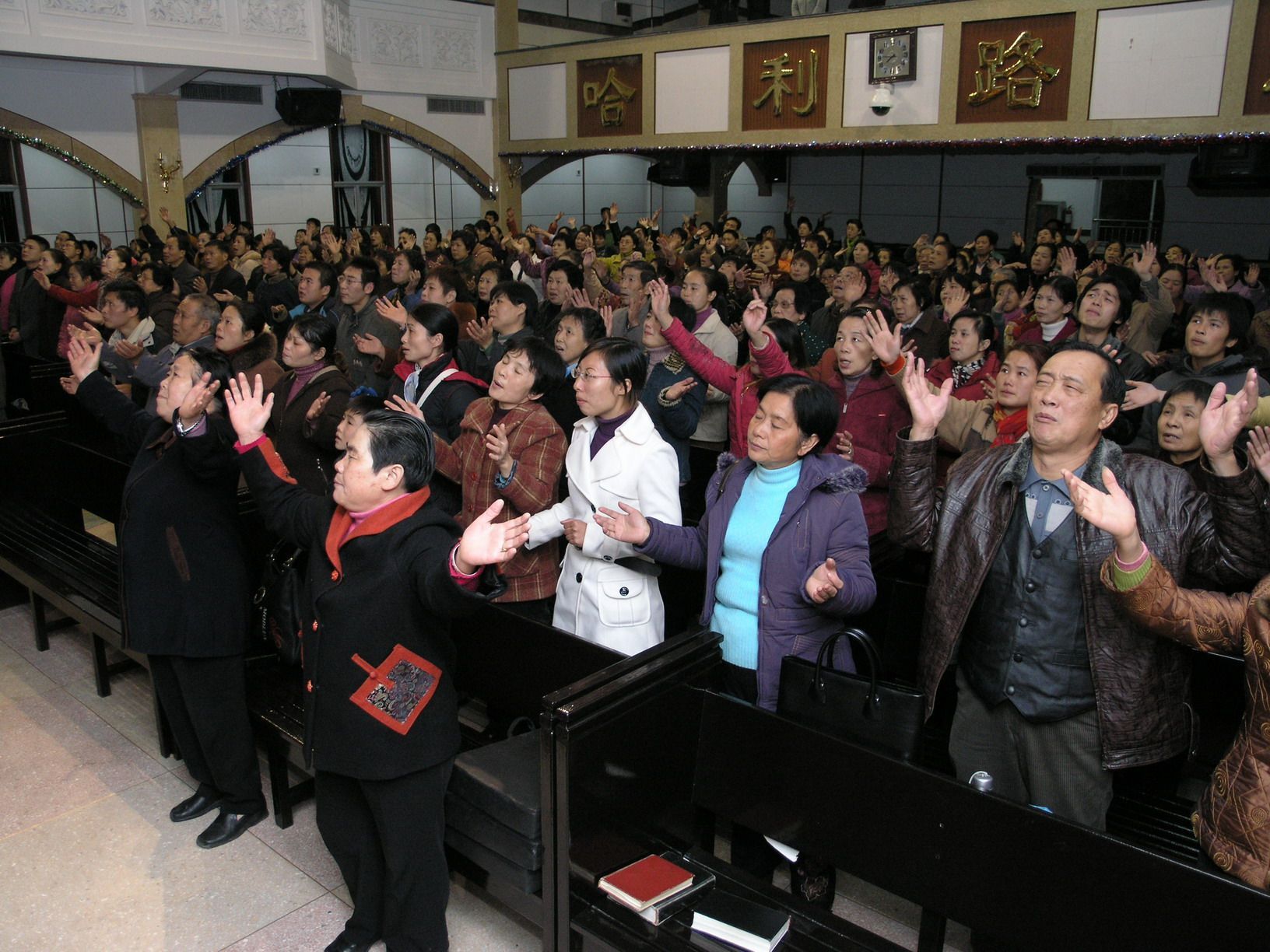2010s
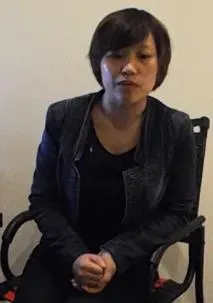
Li Fengfei. [China Aid]
Despite the peaceful interlude, cruel persecution occasionally broke out in the province. At Bijie in 2013, a Christian Miao woman named Li Fengfei was forced by government officials to have a second trimester abortion. The procedure not only killed her precious baby, but it left Li in critical condition. In the age of social media, she took to the internet to share her story of abuse. In response, the Jinsha Municipal Public Security Bureau invented trumped up charges and arrested her for embezzlement.
As another sign of the times, a Guiyang legal firm, led by a Christian lawyer named Li Guisheng, met with Li Fengfei in prison and took on her case against the corrupt government. They found that she had previously held an important job as an accountant at a Bijie bank, but when the bank manager wanted to embezzle money, Li Fengfei refused to falsify the documents, as it was contrary to her faith in Jesus Christ. This righteous stand was the origin of the false charges brought against her. The bank manager had family members who worked in the county's Communist disciplinary committee, and they framed Li in a bid to hide their own evil deeds.
Sister Li's horrible account is just one of countless similar experiences that Christian women have been forced to endure throughout Guizhou and the rest of China. Thousands of women have been forcibly sterilized to prevent them having children, and a long roll of misery has been afflicted upon the children of light by the God-hating atheists who control the reins of power in China.
In recent years, many Christians have adopted a new approach in response to persecution and harassment by government officials. In 2014, after 12 house church Christians were arrested for possessing a hymnal which the government deemed illegal, five of the detained believers filed administrative lawsuits to challenge their arrests.
Despite this new approach by some Christians, persecution continued to be a reality in the lives of many believers in Guizhou. In the town of Daguan, dozens of armed police officers with attack dogs raided a Sunday worship service on June 1, 2015, arresting dozens of the 70 to 80 believers gathered for the service. The officers released their savage dogs on the congregation, most of whom were impoverished farmers. Many people were bitten, and all the believers' possessions were confiscated, despite the police having no search warrant or reason to conduct the raid.
Weeks following the incident, 11 Daguan Christians remained in custody. It transpired that the local government officials were alarmed by the large numbers of people becoming Christians, and they had threatened to cut-off government assistance to anyone who converted to Christianity. Many people who had joyfully found Jesus Christ firmly resisted the threats. The officials launched their raid in retaliation, but it did nothing to dim the believers' zeal. Instead, it made them even more determined to follow God wholeheartedly and to share the gospel with unbelievers.
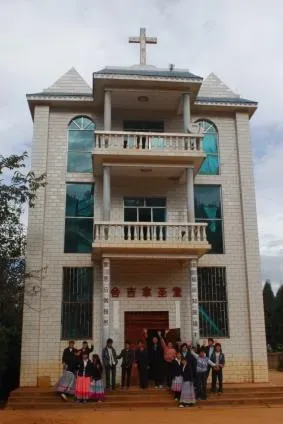
A Three-Self church attended by Miao Christians. [Miao Messenger]
Many similar incidents have marked a new line in the sand for Christian leaders in Guizhou. At times, the authorities appeared bewildered by the aggressive legal push-back from Christians, who were fed up with being abused by corrupt officials. The believers, for their part, stressed that their trust is in the Lord Jesus for deliverance. For decades they had suffered in silence, but encouraged by the Apostle Paul's occasional use of his legal rights when he preached the gospel, the Guizhou Christians decided to fight back, firstly in prayer, but also through China's developing legal system.
2016 — A Storm is Unleashed
In 2016, China dramatically reversed its policies, and full-scale persecution of house church Christians broke out in many parts of China, including Guizhou. The directive to crush the house churches appears to have come directly from Chinese President Xi Jinping, who urged action against Christians in several speeches. New laws were quickly passed in 2015 to help implement the furious storm that was about to be unleashed against the body of Christ throughout China.
Pressure was placed on Guizhou's Christians in various ways. At Huaqiu, government officials threatened believers and tried to intimidate them by punishing their children. After issuing an official notice, "Government personnel coerced members of the Huaqiu Church to sign a document saying they would no longer take minors to church. Any children who attend the church will be ineligible for the college entrance exam or admittance into a military academy, and parents who continue to bring their children to church will be sued."
House church leaders were the main target of the government crackdown. They were ordered to register their congregations with the Three-Self Patriotic Movement, and to provide the full names and details of every person who attended their services. When they refused to do so, many pastors were arrested and forced to endure barbaric torture. When the believers at Huaqiu refused to submit to the bullying, the authorities seized the property and demolished their church building, citing an obscure building code violation.
The wide-ranging crackdown on Christians occurred even in remote tribal areas of Guizhou, with one minister of the gospel reporting in November 2016:
"In the past few months, new regulations in China have been put into effect to persecute believers. Christians in Miao areas have been followed, questioned, falsely accused, imprisoned, chased from the towns where they live, and denied basic rights that most citizens enjoy, such as pensions for the elderly and college education."
The Huoshi Church
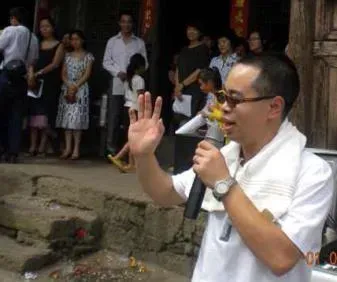
Pastor Yang Hua.
After receiving new directives to destroy the house churches, the authorities in Guizhou wasted little time. They targeted the Huoshi (Living Stone) Church, which had quickly grown to become the largest house church in Guiyang, with a congregation of about 700 believers. The main leader of the church, Li Guozhi, is commonly known by his spiritual pseudonym Yang Hua.
The trouble started for Yang in 2015, when he was arrested along with other pastors and deacons of the Huoshi church. The congregation had outgrown their facilities at the time, so they purchased office space on the 24th floor of the Huaguoyuan International Center in Guiyang, and began to hold their services there. Government officials heard about their plans and warned them not to proceed, and issued a threat that all attendees would be arrested. Yang and his co-leaders refused to bow to the intimidation, and they held an opening dedication service, which was attended by hundreds of believers.
On October 21, 2015, the authorities carried through with their threats. A notice was posted that the church was an illegal gathering, and that none of its leaders were ordained religious practitioners approved by the state. A cumulative fine was put into effect, with the church required to pay 12,960 Yuan (more than US$2,000) per day until it was closed down.
When the church still refused to comply with the orders, officers were dispatched to disrupt the meetings on numerous occasions. Believers were harassed and filmed, property was confiscated, and some church members were arrested.
Yang was also arrested, and was beaten and tortured in detention, before a black hood was placed over his head and he was moved in an unlicensed vehicle to a different facility to await trial.
The Huoshi Church had functioned in a way that Chinese believers of previous generations could never fathom. The congregation consisted of believers from all walks of life, including wealthy businessmen and humble street sweepers. They legally purchased the facility and were paying off a monthly mortgage of 30,000 Yuan ($ 4,500) when the arrests occurred. The government banned their meetings and froze the church's bank account, which contained a balance of 600,000 Yuan ($88,000) at the time. This prevented the church from meeting their mortgage obligations.
In January 2016, the severity of Yang's case was greatly increased after the corrupt government officials altered the charges against the unassuming pastor to 'divulging state secrets,' a serious charge that potentially carries the death penalty.
The Huoshi church members banded together and secured legal counsel to fight the charges, and a website was created to update concerned Christians in China and around the world of the plight of the pastor and his scattered congregation. The case quickly grew in prominence as alarmed church leaders throughout China realized that Yang's arrest was likely to set a new precedent, and that if he was charged as a spy, then similar charges could be levelled against other pastors throughout the country.
On June 30, 2016, Yang Hua wrote a loving letter from prison to his wife, detailing some of the methods used against him to extract a forced confession. He also courageously shared some of the spiritual benefits his incarceration had produced:
"This is a good place to rest, where I am cut off from the rest of the world and brought closer to God. I can no longer hear the clamorous noises, but can better listen to the Lord's still voice.... Genuine rest has nothing to do with the environment. No matter if the waves are quiet or the sea roars, our hearts rest in God as a weaned child sleeps in its mother's arms. I want to thank God for using this special method to give this gift to our family. Let us accept and enjoy it with thankful hearts."
In January 2017, after more than a year in custody, Yang Hua was finally convicted on the spurious charge of divulging state secrets and was sentenced to two-and-a-half years in prison. The same men who had tortured Yang in prison were allowed to act as the court prosecutors.
The Huoshi Church, meanwhile, struggled to reorganize itself after the savage persecution, but the government, as always, failed to comprehend that the kingdom of God lives in the hearts of believers, so that even if their bodies are killed the living seed of God's Word goes on achieving His eternal purposes. The Huoshi believers began meeting in smaller home groups, and the praises of Jesus Christ continues to rise up to heaven.
By October 2017, all hope of justice seemed to have died for Yang Hua. As he continued to languish behind bars in Kaili Prison, the government fined him and another church leader, Su Tianfu, the exorbitant sum of 7 million Yuan (just over $1 million), which officials claimed the church had received as "illegal income" between 2009 and 2015. The two pastors applied to the legal system to argue that it was the church's income, not their own, and that as the church expenses during those six years had exceeded the income, there was no case to be answered. Their request for a hearing was denied.
The Fire Still Burns among the Tribes
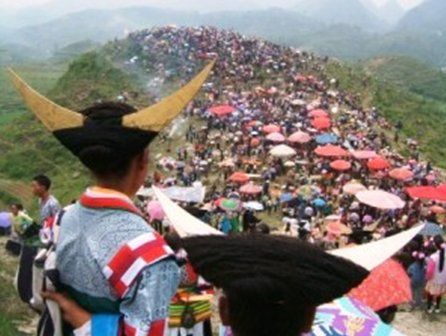
A large group of Christians from the Horned Miao tribe meet on a hillside in Guizhou. [OMF]
While the house churches in many parts of Guizhou were under intense pressure from the new and sustained government crackdown, the gospel continued to advance among the people groups in the province, one transformed life at a time.
The Horned Miao—so-called because of their women's custom of wearing wooden horns on their heads—boast a population of approximately 80,000 people, distributed throughout 550 villages in Guizhou.
Although they live in the same general area as the A-Hmao and Gha-Mu tribes, both of which have contained thousands of Christians for over a century, the Horned Miao have only recently experienced a widespread turning to Jesus Christ.
The movement began in 2004, and grew exponentially after Horned Miao church leaders received Bible training. They took the fire from the altar of God and launched an initiative to plant churches in all 550 Horned Miao villages within three years.
The leaders were true to their commitment, and empowered by the Holy Spirit, thousands of Horned Miao people met Christ for the first time. As the movement expanded, the new churches soon faced the same challenges of countless other tribes before them. Almost all Horned Miao people are illiterate, and no Bible portions or Scripture recordings exist in their language. The church leaders faced the difficult task of establishing believers in sound doctrine without any part of the Bible being available in their heart language.
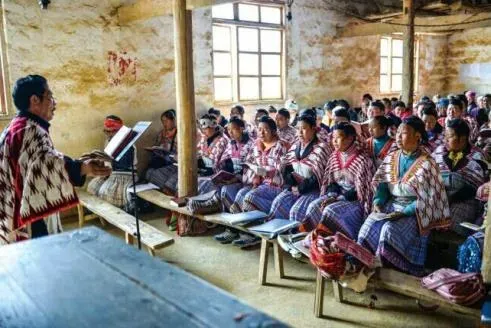
A Miao congregation at Ziyun, Guizhou. [China Christian Daily]
In recent years, news emerged that another strong Christian movement had occurred among the Hmong Shua tribe, who first heard the gospel from James Adam more than a century ago. Many new Hmong Shua churches containing hundreds of Christians were established, and a Bible translation project in the Hmong Shua language was launched. Bible stories were produced in audio form, and work commenced to translate the Jesus film into Hmong Shua.
After decades of slow progress with little to show for the efforts of the early pioneer missionaries, the kingdom of God was finally flourishing among these two tribes and others throughout Guizhou.
© This article is an extract from Paul Hattaway's book 'Guizhou: The Precious Province'. You can order this or any of The China Chronicles books and e-books from our online bookstore.





